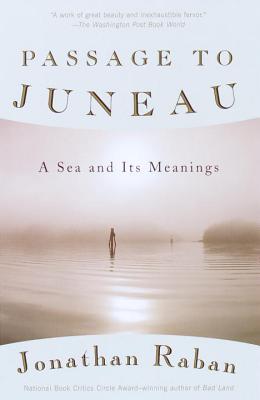Travel writers are a diverse lot. The great ones—Evelyn Waugh, Somerset Maugham, Graham Greene—sought out the seedy outposts of colonialism, frequenting hotel bars peopled by jaded, witty expatriates. Others, such as Bruce Chatwin, who tramped through Patagonia and Afghanistan with only a rucksack, preferred roughing it. hi A Passage to Juneau: A Sea and Its Meanings, Jonathan Raban (author of the 1996 National Book Critics Circle Award-winning Bad Land) has added a new twist to the genre: the armchair traveler who takes his armchair with him.
That armchair is aboard the Penelope, a 30-foot ketch of which Raban is a competent helmsman. She is stocked with good food, wine, and books (natural history, ethnography, nautical subjects) by the yard. The author’s journey takes him up the wild Inside Passage from Seattle to Juneau, Alaska, a region replete with landmarks named Deception Pass, Desolation Sound, Cape Caution, and Blind Channel—places subject to quickly changing weather and dangerous tides and inhabited by rough merchant seamen, crusty fishermen, the indigenous Indians, and the often-despised summer tourists on large cruise ships. In fair weather, the area is one of placid waters, spectacular mountain scenery, and abundant wildlife. In foul, it is a cold, Dantesque maritime hell.
Jonathan Raban’s tour guide is George Vancouver —Captain Van as he was known to his near-mutinous crew. One of the great mariners of his time and the namesake for the large Canadian city, Vancouver was the Passage’s first indepth explorer and cartographer, and his four-volume eponymous Voyage: 1791-1795 is Mr. Raban’s Bible. Vancouver serves at the same time as the writer’s alter ego and his opposite, as Raban’s romantic view of his surroundings (he liberally quotes the likes of Wordsworth, Shelley, and John Muir throughout his text) contrasts with Captain Van’s: The latter’s books are full of references to “sterile” mountains, whereas Raban delights in “hoary crags and crystal cascades.”
Captain Van was a proto-Ahab who ruled his two ships—Discovery and Chatham—with an iron fist. The Melvillean analogy can be extended to his crew’s malcontents, a group of young English aristocrats seeking adventure while expecting a wilderness version of “The Grand Tour.” Vancouver would tolerate no loafing and literally applied the lash to his crew in times of storm and stress. (The surnames of some of these troublemakers —Puget, Baker, Rainier, et al.— now grace well-known landmarks in the Pacific Northwest.) This severity, coupled with his lineage—he was of Dutch extraction, though English-born—promoted bad feeling that was exacerbated by Vancouver’s strict prohibition of libidinous traffic with the local Indians. Using his writings and maps, Raban meticulously traces the captain’s route northward along the sublime coast of British Columbia.
Alaska is much on Raban’s mind. Seeing the “Last Frontier” is the raison d’etre of his maritime odyssey. Alaska’s history is one of constantly trying to beat the odds. Booms, busts, hard work, and weather take their toll on the unwary and starry-eyed pilgrim. While fitting out his boat in Seattle, Raban employs John Munroe, much admired and respected as a true Alaska-hand, who describes life in the remote hamlet of Togiak during a boom in the highly competitive commercial herring industry: “It was wild. The s–t was really flying. Incredible mass destruction. Rammings. Sinkings. Shootings. A midair collision, right over town. . . . Dead guys. A lot of dead guys. People you knew—friends—they’d drown, or get shot, or disappear. But it wasn’t dull, like California.” Raban adds: “In the dog days of peacetime, Alaska held out the promise [for young men] of all the noise and excitement of a major foreign war.”
When Mr. Raban arrives in Ketchikan, he finds a hodgepodge of “pawnshops and tattoo parlors” and the Sunday morning streets littered with the detritus of a hard-drinking boreal Dodge City. In summer, thousands of seasonal cannery workers, commercial fishermen, loggers, and those camera-clicking tourists crowd the place. Ketchikan is hemmed in by the mountains and the sea, breathtaking beauty leavened by environmental “spoliation” in the form of clearcuts in the nearby Tongass National Forest, where the mountains appear “tonsured like monks.” Since everything comes into Ketchikan from Seattle via plane or ship, Raban finds himself dropping $231 in a single trip to the local supermarket: “That was another measure of Alaska’s condition as a client state of the Lower 48: a box of Cornflakes, or a stick of butter, was a luxury import. Almost the only locally manufactured goods I could find were six packs of beer at the neighboring liquor store.”
Sailing into Juneau’s gorge-like bay, Raban scans the scene for the governor’s mansion, which he finds prosaic compared to the ever-present manifestations of Alaska’s love ’em, hate ’em tourist industry: “The ships grandly belittled the town. None of Juneau’s buildings could hold a candle to the many-storied, snow white magnificence of the floating republics of Holland-America, Princess, Royal Caribbean.” And so his thousand mile voyage ends.
Mr. Raban is overtaken in mid-trip by word from England of his father’s serious illness and impending death, which causes him to quit the sea and make for London. Journey’s end in Juneau brings him news of his wife’s request for a divorce. These digressions (amounting to 50 pages), while certainly important to Jonathan Raban, are not so to the reader. Though if he sees his seaborne odyssey as a metaphor for a personal midlife crisis, at least it is one vividly rendered, with expansive vistas and the pungent smell of the sea.
[A Passage to Juneau: A Sea and Its Meanings, by Jonathan Raban (New York: Pantheon) 435 pp., $26.50]



Leave a Reply